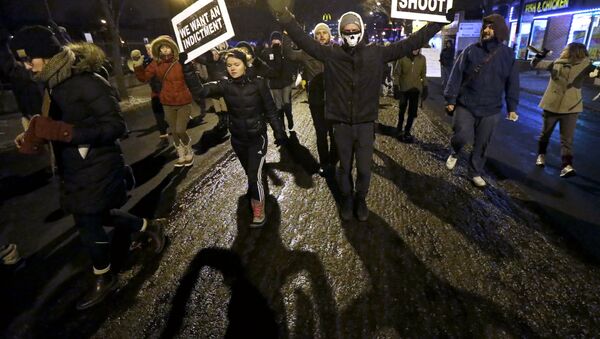Activists in Chicago who have taken to the streets in protest say law enforcement authorities are eavesdropping on their conversations using “stingray” technology.
Stingrays are devices that masquerade as cellphone towers. They trick mobile phones into sending them data, allowing law enforcement to listen into a particular conversation or to harvest other information, like the phone’s unique identification code. Stingrays and similar technologies are rapidly being adopted by police departments across the U.S., in co-operation with organizations like the FBI.
Chicago police admitted they purchased stingrays, or similar devices, in 2008.
At a protest on "Black Friday" last month, activists say they have proof police used the technology based on this radio exchange between cops on the street and other police back at the station:
Dispatch: “CPIC [Chicago police special operations] on the air for a mobile”
Officer 1: “Go ahead”
Officer 2: “Yeah one of the girls, an organizer here, she’s been on her phone a lot. You guys picking up any information, uh, where they’re going, possibly?”
Officer 1: “Yeah we’ll keep an eye on it, we’ll let you know if we hear anything.”
Officer 2: “10-4. They’re compliant, and they’re, they’re doing ok now but she’s spending a lot of time on the phone.”
Officer 1: “10-4”
Other protestors tweeted about a Chicago police vehicle with a strange device on top that seemed to disrupt cellphone traffic as it drove by:
— Page May (@may20p) December 5, 2014
Protesters in other cities have reported encountering similar problems.
— Russell Little (@RussellLittle) December 5, 2014
Cellphones and social media have been an integral part of organizing demonstrations nationwide over the last few weeks.
The American Civil Liberties Union says it has information indicating that 47 police departments in 19 states are using stingray technology as part of their routine investigations. The problem is that the public has been kept in the dark about where and when the technology is being employed.
“The government is hiding information about new surveillance technology not only from the public, but even from the courts,” wrote ACLU staff attorney Linda Lye in a legal brief.
“By keeping courts in the dark about new technologies, the government is essentially seeking to write its own search warrants, and that’s not how the Constitution works.”


